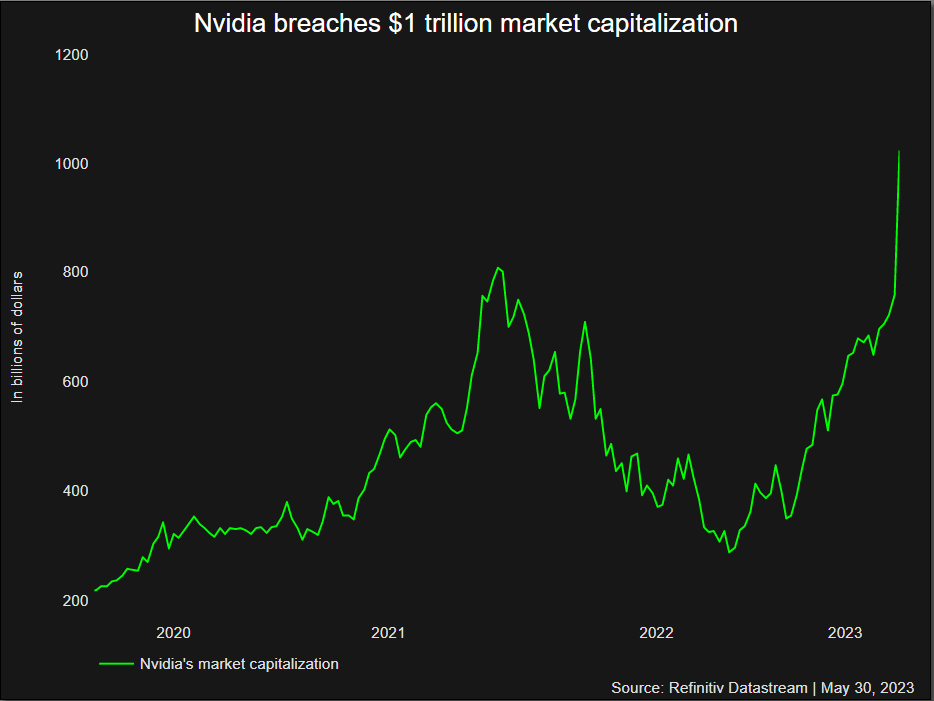May 30 (Reuters) – Nvidia Corp (NVDA.O) joined an elite club of U.S. companies sporting a $1 trillion market value on Tuesday, as investors piled into the chipmaker that has quickly become one of the biggest winners of the AI boom.
The stock’s value has tripled in less then eight months, reflecting the surge in interest in artificial intelligence following rapid advances in generative AI, which can engage in human-like conversation and craft everything from jokes to poetry.
Nvidia has gained roughly 240% since October, far outpacing any other member of the broad-market S&P 500 index. The rally has propelled its valuation past its peers, but some analysts say the AI boom means the stock should still be worth more.
Its shares were up 5.7% on Tuesday. Just four other U.S. companies currently have a valuation of more than $1 trillion – Apple Inc (AAPL.O), Alphabet Inc (GOOGL.O), Microsoft Corp (MSFT.O) and Amazon.com Inc (AMZN.O).
“We view Nvidia as the most important company on the planet in an era that is rapidly changing towards one that will be emphasized by greater AI capabilities,” said Angelo Zino, analyst at CFRA Research.
The latest surge furthers a rally from last week, which was jump-started by a revenue forecast that surpassed the mean Wall Street estimate by more than 50%, which some analysts called “unfathomable” and “cosmological.”
The highest price target values the company at about $1.6 trillion, on par with Google-parent Alphabet.
Nvidia’s forward price-to-earnings multiple (P/E), a common benchmark for valuing stocks, is 47.49 – is significantly above that of peers Qualcomm (QCOM.O) and Intel (INTC.O) and also tops the sector median of 18.09, according to Refinitiv data.
“While the company’s valuation looks lofty at the moment, we think Nvidia has the earnings firepower as the adoption of its AI GPU remains in the very early innings,” Kinngai Chan, senior research analyst at Summit Insights Group, said.
GPU CHIPS
Big Tech companies have shifted focus to AI on hopes the technology will attract demand. The computers that power generative AI run on powerful chips called graphics processing units (GPUs) – of which 80% are produced by Nvidia, according to analysts.
OpenAI-owned ChatGPT’s rapid success has prompted tech giants such as Alphabet and Microsoft to make the most of generative AI.
Nvidia, led by CEO Jensen Huang, has pivoted to the data center market over the last few years after years as a powerhouse in videogame chips.
The company’s business rapidly expanded during the pandemic when gaming took off, cloud adoption surged and crypto enthusiasts turned to its chips for mining coins. Huang’s bet on AI is expected to fuel growth in the coming months.
Despite the sky-high valuation, analysts believe Nvidia’s AI chips business has room for growth as generative AI technology is still at a nascent stage with wide adoption expected in the years to come.
Last week alone, Nvidia’s shares rose about 25%, sparking a rally in AI-related stocks and boosted other chipmakers. That helped the Philadelphia SE Semiconductor index (.SOX) close on Friday at its highest in over a year.
“Technical traders and AI mania have pushed Nvidia toward the $1 trillion cap and it is not inexpensive,” said Jim Kelleher, analyst at Argus Research.
Reporting by Akash Sriram, Samrhitha Arunasalam Medha Singh and Shashwat Chauhan in Bengaluru; Editing by Shounak Dasgupta and Saumyadeb Chakrabarty
Our Standards: The Thomson Reuters Trust Principles.
